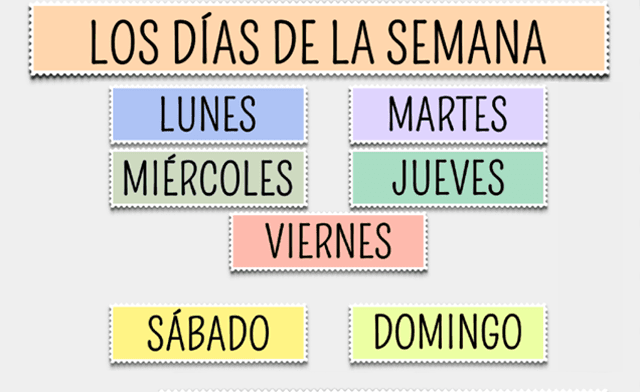Mastering the days of the week is essential. Here’s a quick guide to the days of the week in Spanish:
- Monday: Lunes
- Tuesday: Martes
- Wednesday: Miércoles
- Thursday: Jueves
- Friday: Viernes
- Saturday: Sábado
- Sunday: Domingo
Table of Contents
- What are the Spanish days of the week?
- Perfecting Your Days of the Week in Spanish Pronunciation
- A couple of other important differences that can be noticed is that, in Spanish, the days of the week are not capitalized and they are all masculine.
- When talking about the days of the week, the definite article “el” takes on the meaning “on” instead of “the”. For example:
- When changing the days of the week that end in -s to their plural forms, only the article changes. You do not add another -s.
- When talking about the days of the week, we use the verb ser. We will learn more about the verb ser in future lessons, but for now you can recognize that the conjugation for this verb es means “is”.
- START YOUR SPANISH CLASSES TODAY
- Mastering the Days of the Week in Spanish: 50 Real-Life Examples to Help You Learn
- Week Days in Spanish: Cultural Insights and Grammar Tips
- Practical Usage of Spanish Week Days: Scheduling and Planning
To start off, as opposed to English speaking countries, Monday is considered the first day of the week in Spanish speaking countries.
What are the Spanish days of the week?
| Spanish | English |
| lunes | Monday |
| martes | Tuesday |
| miércoles | Wednesday |
| jueves | Thursday |
| viernes | Friday |
| sábado | Saturday |
| domingo | Sunday |
Perfecting Your Days of the Week in Spanish Pronunciation
Command over the pronunciation of spanish weekdays is crucial in day-to-day interactions. Embrace the phonetic clarity Spanish offers—a language where sounds align consistently with spelling. From the streamlined sound of “lunes” (loon-es) to the rolling cadence of “domingo” (do-meen-go), Spanish pronunciation invites learners to speak with confidence and precision. As you navigate the Spanish days of the week, allow the language’s phonetic consistency to be your guide from the very first “lunes” to the closing “domingo”.
A couple of other important differences that can be noticed is that, in Spanish, the days of the week are not capitalized and they are all masculine.
- el lunes
- el martes
- el miércoles
- el jueves
- el viernes
- el sábado
- el domingo


When talking about the days of the week, the definite article “el” takes on the meaning “on” instead of “the”. For example:
| Spanish | English |
| No estudié el lunes. | I didn’t study on Monday. |
| No estudio los martes. | I don’t study on Tuesdays. |
| Hay una feria el miércoles. | There is a fair on Wednesday. |
| Hay muchas ferias los viernes. | There are many fairs on Fridays. |
When changing the days of the week that end in -s to their plural forms, only the article changes. You do not add another -s.
- el lunes
- los lunes
- el martes
- los martes
- el miércoles
- los miércoles
- el jueves
- los jueves
- el viernes
- los viernes
- el sábado
- los sábados
- el domingo
- los domingos
When talking about the days of the week, we use the verb ser. We will learn more about the verb ser in future lessons, but for now you can recognize that the conjugation for this verb es means “is”.
| Spanish | English |
| ¿Qué día es hoy? | What day is today? |
| Hoy es miércoles. | Today is Wednesday. |
| Mañana es jueves. | Tomorrow is Thursday. |
START YOUR SPANISH CLASSES TODAY
Mastering the Days of the Week in Spanish: 50 Real-Life Examples to Help You Learn
| English Example | Spanish Example |
|---|---|
| Monday mornings are always busy for me. | Las mañanas de los lunes siempre son muy ocupadas para mí. |
| I have a dentist appointment on Tuesday afternoon. | Tengo una cita con el dentista el martes por la tarde. |
| Wednesday is my favorite day of the week. | Mi día favorito de la semana es el miércoles. |
| The deadline for this project is Thursday. | La fecha límite para este proyecto es el jueves. |
| We usually go out to eat on Fridays. | Normalmente salimos a comer los viernes. |
| Saturday mornings are perfect for sleeping in. | Las mañanas de los sábados son perfectas para dormir hasta tarde. |
| Sundays are great for catching up on work. | Los domingos son ideales para ponerse al día con el trabajo. |
| I like to go for a run on Monday evenings. | Me gusta salir a correr los lunes por la noche. |
| Tuesdays are when we have our weekly team meeting. | Los martes tenemos nuestra reunión semanal de equipo. |
| Wednesday afternoons are my designated ‘me time’. | Las tardes de los miércoles son mi tiempo para mí. |
| On Thursdays, we usually have dinner with friends. | Los jueves normalmente cenamos con amigos. |
| Fridays are for celebrating the end of the work week. | Los viernes son para celebrar el fin de la semana laboral. |
| Saturdays are great for running errands and doing chores. | Los sábados son ideales para hacer mandados y hacer tareas del hogar. |
| Sundays are a day of rest and relaxation. | Los domingos son un día de descanso y relajación. |
| I always have a coffee date with my friend on Mondays. | Siempre tengo una cita de café con mi amigo los lunes. |
| Tuesday mornings are when I go grocery shopping. | Los martes por la mañana es cuando voy a comprar comida. |
| Wednesday evenings are when I take my dance class. | Los miércoles por la noche es cuando tengo mi clase de baile. |
| Thursdays are when I volunteer at the local animal shelter. | Los jueves es cuando hago trabajo voluntario en el refugio de animales. |
| Friday nights are for going out with friends. | Las noches de los viernes son para salir con amigos. |
| I like to sleep in on Saturdays and have a lazy morning. | Me gusta dormir hasta tarde los sábados y tener una mañana tranquila. |
| Sundays are perfect for a family brunch. | Los domingos son perfectos para un brunch familiar. |
| I always have a busy schedule on Mondays. | Siempre tengo una agenda muy ocupada los lunes. |
| Tuesdays are when I go to my evening yoga class. | Los martes por la noche es cuando tengo mi clase de yoga. |
| I have a dentist appointment on Wednesday morning. | Tengo una cita con el dentista el miércoles por la mañana. |
Memory Techniques: Infographics and Mnemonics
Mnemonics turn the challenge of memorization into a creative exploration of connections. By crafting a vivid mental image of Mars for Martes or envisioning a love-filled scene for Viernes, we create hooks for remembering the Spanish days of the week. Furthermore, infographics provide a visual context that makes learning Spanish weekdays an engaging and colorful journey. To fortify your grasp of the Spanish days, consider:
- Creating rhymes or songs, like a Spanish reinterpretation of the childhood classic “Oh My Darling, Clementine” to internalize the days in spanish language.
- Using flashcards featuring names of week days in spanish, rotate them daily as part of your morning routine.
- Joining platforms like Busuu to practice learn spanish weekdays with interactive lessons.
- Assembling a physical or digital calendar, filling your week with vibrant Spanish names for the days of the week.
Every day offers a fresh opportunity to integrate and apply names of the days in Spanish, making them a seamless aspect of your lexicon. Practice regularly, and soon, discussing your plans for “el próximo martes” or “este viernes” will feel as natural as breathing. Continue on this voyage of language acquisition, where each spanish weekday becomes a part of your everyday dialogue.
Week Days in Spanish: Cultural Insights and Grammar Tips
Understanding the days of the week in Spanish opens a window into the everyday life and culture of Spanish-speaking regions. Not merely a matter of translation, these weekdays in Spanish provide a deeper grasp of how societies structure their time and mark their calendars. For instance, the week in Spain and many Latin American countries typically commences on lunes, setting the tone for a cultural rhythm distinct from that of English-speaking regions where Sunday often leads.
Awareness of the correct utilization of Spanish weekdays enhances not only verbal communication but also written correspondence. Unlike English, there’s a notable absence of capital letters for Spanish day names unless they inaugurate a sentence or sit within a title. This lessens the formality and heralds the grounded, day-to-day importance of these terms. It’s vital to embrace these grammatical nuances to converse with accuracy and cultural respect.
| English Day Name | Spanish Day Name | Pronunciation Hint | Use in the Week |
|---|---|---|---|
| Monday | Lunes | loon-es | Start of the workweek in Spanish-speaking regions |
| Tuesday | Martes | mar-tes | Second weekday, named after Mars |
| Wednesday | Miércoles | mee-air-co-les | Midweek day, linked to Mercury |
| Thursday | Jueves | hweh-ves | Fourth weekday, honors Jupiter |
| Friday | Viernes | vee-air-nes | Day of Venus, signaling the impending weekend |
| Saturday | Sábado | sah-bah-doh | Day of rest, akin to the Sabbath |
| Sunday | Domingo | do-meen-go | Traditionally seen as the Lord’s Day |
Not only do the week days translated to Spanish carry historic significance, but their abbreviations also differ markedly from their English counterparts. For ease and brevity, Spaniards might jot down “L” for lunes and “D” for domingo, noting the sequence in which they think about their weeks from lunes to domingo. This divergence from the English “S-M-T-W-T-F-S” sequence underscores the importance of immersion in local conventions for anyone learning Spanish.
- Memorize the unique starting point of the Spanish week with lunes as your guidepost.
- When jotting down plans or appointments, remember that “L” is for lunes, not for Friday as in “Lunes” to “Domingo” (from Monday to Sunday).
- Reserve uppercase for kickoff words in sentences and formal names, a subtlety that makes Spanish both beautiful and practical.
Engage with the Spanish days of the week as living components of speech and tradition, not as rigid terms to be rote learned. Cultivating this genuine understanding and practical application of the weekdays in Spanish will both enrich your communication skills and deepen cultural appreciation. Whether you’re discussing week days in Spanish or utilizing them to plot out future adventures, these essentials will serve as faithful companions on your journey to linguistic proficiency.
Practical Usage of Spanish Week Days: Scheduling and Planning
Embarking on the mastery of Spanish weekdays enriches your linguistic toolset with essential elements for efficient scheduling and planning. This knowledge enables you to navigate both personal and professional landscapes with greater confidence. Whether you’re looking to learn spanish weekdays, engage with weekdays in Spanish translation, or simply aim to integrate week days in Spanish into daily exchanges, this guide propels your linguistic capabilities to new heights. Let’s explore the practical implementations of spanish days of the week, guiding you from common phrases to cultural nuances.
Expressing Days of the Week in Common Phrases
As you venture through the intricacies of how to say days of the week in Spanish, familiarize yourself with pivotal phrases like “Hoy es…” (Today is…) and “Mañana es…” (Tomorrow is…). These expressions, paired with the pivotal verb “ser”, construct the foundation for discussing current and upcoming events. Phrases such as “hoy es lunes” and “el martes tengo una reunión” are not just statements of time but conversational gateways to interpersonal connections and opportunities in Spanish-speaking communities.
Understanding the Spanish Calendar: Starting on Lunes
In Spanish-speaking cultures, the calendar week takes root on lunes, signaling the workweek’s commencement. This starting point is encapsulated in a series of abbreviations ranging from “L” to “D,” denoting lunes through domingo. Recognizing this framework is a vital aspect of understanding the structure and order within Spanish itineraries, aiding in accurate and culturally attuned communication.
Capitalization and Plurality in Spanish Week Days
Weekdays in Spanish showcase a distinctive feature: their names begin with a lowercase letter unless they arise at a sentence’s start or within a title. Broadening your grasp of Spanish capitalization norms conveys respect and understanding of the culture’s textual customs. Furthermore, grasp the days’ inherent masculinity and how plurality manifests—via articles like “los martes,” and with “sábados” and “domingos” uniquely gaining an “s”.
Days of the Week in Spanish
Click the day of the week that matches the Spanish word


Maria Olson
At VAMOS Academy, I craft stories sprinkled with my love for exploration and food. Whether it's the tang of a local dish or the rhythm of a new dialect, I bring these experiences to you. Ready for an adventure that tickles your taste buds and ignites your wanderlust? Let's embark on this journey together, one story and one bite at a time.


If you need help with your school project or need a Spanish teacher, we can help you! We offer One-on-one Spanish Classes online or in person for both the US and Canada.
Spanish Teacher in Milwaukee
Spanish Teacher in Toronto
Spanish Teacher in Ottawa
Spanish Teacher in Montreal
We also have online classes!
Hey there! I’m Maria Olson, your go-to nomad with a suitcase in one hand and a pen in the other, forever caught in the dance of Buenos Aires’ energy and Malaga’s serene vibes. My life’s an open book of travels, stitched together by the countless cultures I’ve embraced and the languages that now flow from my tongue as easily as my native speech. Speaking Spanish, English, French, German, and Russian isn’t just a party trick; it’s my way of unlocking the world’s secrets, one conversation at a time.
But let’s talk about the real spice of life—food. My adventures are nothing without the flavors I’ve savored and the culinary treasures I’ve unearthed along the way. Whether it’s diving into Argentina’s vibrant markets or sipping on sangria in a hidden corner of Spain, I bring these experiences to the table, sharing a slice of the world through my tales.
Crafting blogs for VAMOS Academy, I blend my wanderlust with a dash of creativity to serve up content that’s as unique as the journeys that inspired them. So, if you’re itching for adventure, hungry for a taste of the unknown, or simply curious about the art of language, you’re in good company.









